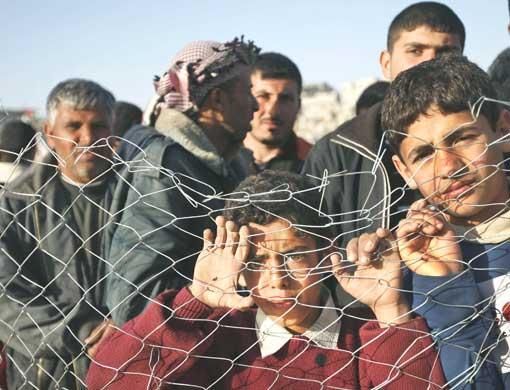Rafah: More than two dozen trucks loaded with food, aid and commercial goods intended for the Gaza Strip are stranded on the Egyptian side of the border, leaving truckers with little to do but sip tea and exude frustration.
Their predicament raises questions about whether a UN emergency appeal launched Thursday for $613 million to help Palestinians recover from Israel's three-week offensive in Gaza will do much good without a deal to free up the flow of aid and other goods through the devastated territory's borders.
"The ordinary people here in Gaza are not getting enough help and are not getting it quickly enough," said John Ging, the top UN official in Gaza.
He blamed the aid shortage on the lack of access to Gaza and demanded that the border crossings be opened.
"There are thousands of tons of assistance generously donated, sitting in Egypt, Jordan and also in the ports in Israel," said Ging. "That aid should be right here, right now, helping the people who need it."
Israeli Cabinet Minister Isaac Herzog told The Associated Press on Monday that Israel was letting in the maximum amount of aid that the Palestinians in Gaza can absorb - about 150 trucks per day.
Israel closed its crossings Tuesday after a bomb attack on the Gaza-Israel border killed one Israeli soldier. The Israeli military said it subsequently restored access, allowing 174 trucks through on Wednesday and 149 on Thursday.
But the UN Relief and Works Agency said aid shipments are hitting bottlenecks on Gaza's borders with Israel and Egypt.
Egyptian officials have not explained why trucks have had trouble crossing into Gaza through the country's Rafah border crossing.
"We don't know why, but it (the border) is closed," said an Egyptian border official Thursday, speaking on condition of anonymity because he was not authorized to talk to the media.
Egypt and Israel effectively sealed their borders with Gaza in 2007 when the militant Palestinian group Hamas seized control of the seaside territory from the more moderate Fatah faction led by Palestinian President Mahmoud Abbas. Israel launched its deadly offensive in Gaza in late December to stop Hamas rocket fire into its territory.
Hamas and Israel agreed to a fragile cease-fire almost two weeks ago, but violence has picked up again in recent days and attempts to transition to a longer-term truce have been hampered by disagreements over the status of Gaza's borders.
Hamas has said it will only agree to a longer-term truce if Gaza's border crossings are opened. But Israel does not want Hamas to have control over its borders, worried that the militant group will use the opportunity to smuggle additional arms into Gaza through the Rafah crossing.
Washington envoy George Mitchell has proposed opening the crossings on the basis of a 2005 agreement brokered by the US that puts Abbas' people in control of the Rafah crossing, with European monitors deployed to prevent smuggling.
Egypt has been exploring the possibility of including Hamas personnel on a border team supervised by Abbas' Palestinian Authority, but that would require some form of reconciliation between the bitterly divided factions.
Without a resolution of the border issue that leads to a longer-term truce, the risk of violence will remain high and it will be difficult to get aid and supplies into Gaza that residents need to rebuild their shattered lives - despite pledges of support from the international community.
"Help is indeed needed urgently," UN Secretary-General Ban Ki-moon told reporters Thursday at the World Economic Forum in Switzerland.
He said donations in response to the UN's emergency appeal will enable the organization and other aid groups to meet critical needs in Gaza for food, clean water, shelter, medicine and restoration of basic services.
But without a deal that officially opens Gaza's borders, any additional aid runs the risk of simply sitting in the back of a truck waiting to enter.
More than dozen trucks packed with white sacks of food were stranded inside the Egyptian crossing terminal Thursday. Another dozen trucks were lined up outside the crossing, and the drivers said they didn't know when they will be allowed in or why they were denied entry.
"We haven't been told whether to stay or to leave and that's really frustrating," said Hassan Mohammed, a 35-year-old driver who has been waiting in front of the Rafah terminal for three days to deliver flour, rice and powdered milk for an Egyptian aid organization .
"We have been waiting for nothing. We just need to unload our shipment and go back to Cairo," he said.













